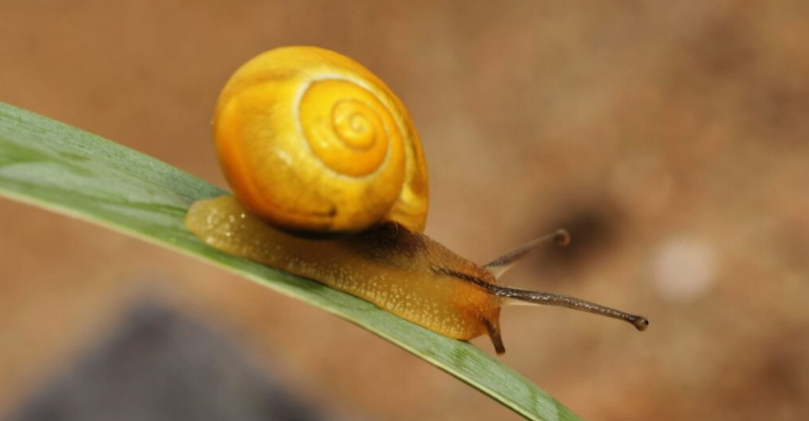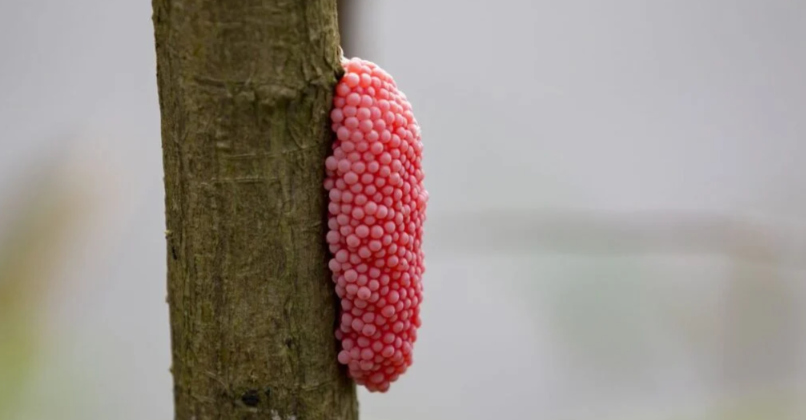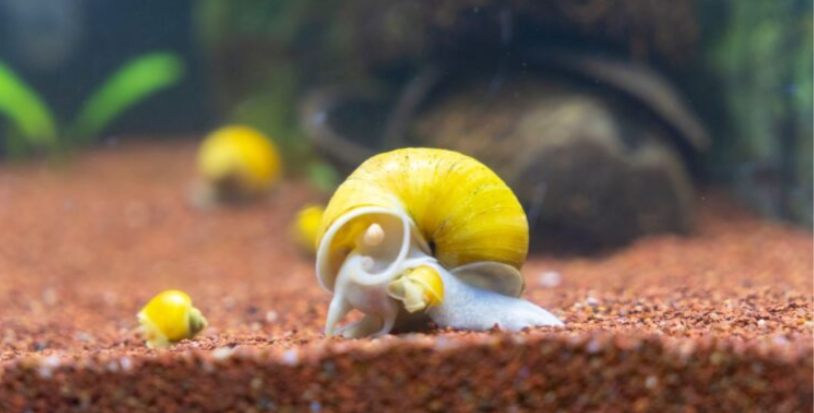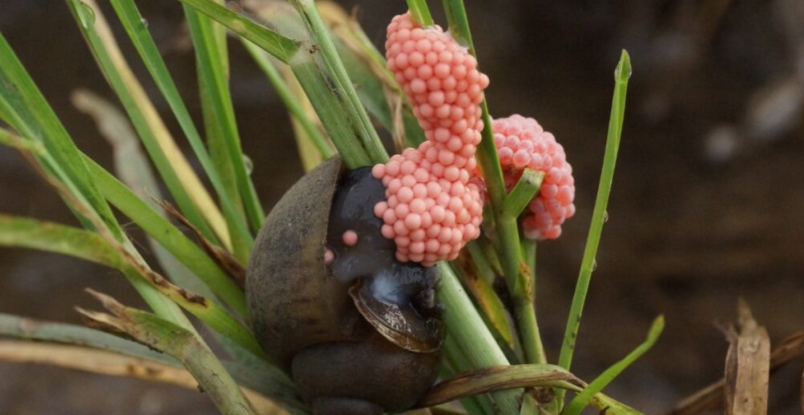If you’ve stumbled on clusters of small, bright pink eggs in your garden, they may look festive or even harmless. But be careful—these pink eggs are actually the work of the invasive apple snail, a species that poses a serious threat to local ecosystems. Originating from South America, these snails have spread globally, wreaking havoc on plants, crops, and natural habitats wherever they establish themselves.
The Apple Snail: A Giant Among Freshwater Snails

Apple snail, a freshwater mollusk, is much larger than the snails you might typically find in a garden. With a shell that can reach up to ten centimeters in width, the apple snail is an impressive, if intimidating, sight. They thrive in wet environments such as ponds, lakes, and swamps, where they can easily spread, especially in warmer climates.
Apple snails lay clusters of pink or orange eggs, each around 2-3 millimeters in diameter. These eggs often appear in groups of 400 to 600, a testament to the prolific breeding habits that make the apple snail such a successful—and dangerous—invader.
Why Are Apple Snails So Invasive?
Apple snails are classified as one of the world’s top 100 most invasive exotic species. They own an astounding ability to adapt, reproduce, and thrive in various environments, thanks in part to global warming. Originally confined to the warm, humid areas of South America, they have since spread to North America, Europe, and Asia, where they are now well-established in several countries.
These snails not only blend into new environments; but they dominate them. Apple snails are voracious eaters, consuming a wide range of plants. In regions like Southeast Asia, where they were introduced in the 1980s, apple snails are notorious for devastating rice fields, causing significant agricultural losses. Given their rapid reproduction and resilience, they can easily outcompete local species for resources, leading to a loss of biodiversity.
Apple Snail Eggs: The Tell-Tale Signs of an Invasion
The clusters of pink eggs laid by apple snails are one of the most visible indicators of their presence. These eggs are typically found on leaves, branches, and other elevated surfaces near water, giving them the best chance to survive and hatch. The bright coloration acts as a warning sign for birds and other potential predators, as apple snail eggs contain toxins that make them less appealing.
When you spot these eggs, it’s important to act quickly. Each cluster of eggs has the potential to produce hundreds of snails, and once they hatch, they can quickly spread and start causing damage. In countries where apple snails have become established, local authorities often encourage residents to report any sightings of these eggs to help control the spread.
Where Have Apple Snails Spread, and What Damage Do They Cause?
Thanks to their adaptability, apple snails have spread far beyond their native South American habitats. In North America, they have established populations in states like Florida, Texas, and California. In Asia, they are now a common pest in rice paddies, while in Europe, they have been reported in countries like Spain and France. In 2018, apple snail eggs were discovered in France near Fréjus, sparking immediate containment efforts. However, even these measures proved insufficient to halt their spread entirely.

The damage caused by apple snails is severe and widespread. They consume vast quantities of aquatic plants, which play a crucial role in maintaining healthy ecosystems by providing habitat, oxygen, and food for other organisms. By depleting these plants, apple snails disrupt the balance of local ecosystems, impacting everything from water quality to fish populations. In agricultural settings, their appetite for young shoots can devastate crops, leading to significant financial losses for farmers.
What Can Be Done to Control Apple Snails?
Due to the rapid reproduction rate and hardiness of apple snails, controlling their spread requires a coordinated effort. In many areas, selling apple snails as pets has been banned, as these snails were often released into the wild by aquarists. However, other measures are necessary to prevent further spread and mitigate the damage they cause.
Here are a few strategies for controlling apple snails:

Reporting Sightings: Many countries have established hotlines or websites where you can report sightings of apple snails or their eggs. Early detection is key to controlling their spread.
Manual Removal: In some areas, local authorities encourage the manual removal of apple snail eggs. This involves scraping the clusters off surfaces and properly disposing of them. When handling apple snail eggs, always wear gloves to avoid potential toxins.
Biological Controls: Researchers are exploring ways to control apple snail populations using natural predators or parasites. However, these measures are still in the experimental stages and are carefully monitored to avoid unintended ecological consequences.
Public Awareness: Education campaigns can help spread awareness about the risks of invasive species like apple snails. Many people don’t realize the potential harm these creatures can cause until it’s too late.
Why Apple Snail Invasions Should Concern Gardeners
If you’re an avid gardener, the thought of these invaders taking over your garden might be unsettling. Apple snails can quickly deplete your garden’s plant life, particularly if you have ponds or other water features. Once established, they can be challenging to eliminate, making it crucial to act fast if you spot their pink egg clusters.

In addition to being unsightly, these eggs signal a larger threat to your garden’s health and the surrounding ecosystem. In places where apple snails have become established, native plant species are often decimated, affecting the entire food chain. By reporting and removing these eggs, you can play a small but vital role in protecting your local environment from further harm.
Conclusion: Vigilance Is Key to Containing the Apple Snail Threat
The sight of pink eggs in your garden may be startling, but recognizing them as the warning sign of an invasive species can help you take swift and effective action. Apple snails and their eggs are more than just a nuisance; they pose a genuine threat to biodiversity, agriculture, and natural ecosystems around the world.
By staying vigilant, reporting sightings, and understanding the risks associated with these invaders, you can help curb their spread and protect the health of your garden and local environment. Remember, it’s up to each of us to do our part in safeguarding the world’s ecosystems—one pink egg cluster at a time.





